‘Lament’ continues the trend started by Aidan Phelan last year for Kelly devotees to write historical fiction, rather than attempt the more difficult task of separating facts from fiction and writing the true story. Author Nicole Kelly – not a relation – says she’s ‘loved the story of the Kelly gang’ as long as she can remember and writes sympathetically of the Gang in this novel, which, like Phelans is about Glenrowan and the aftermath. However, unlike Phelans novel, this one has a much looser attachment to the historical and a much greater reliance on the fictional. It’s a light read in a ‘sliding doors’ kind of style, that will be entertaining to Kelly devotees but will annoy people like me who can’t help noticing all the historical errors and Kelly myths that underlie and are perpetuated in the story. Never-the-less, the writing was engaging enough, and the story imaginative enough that I managed to read the entire thing. 3 Stars.
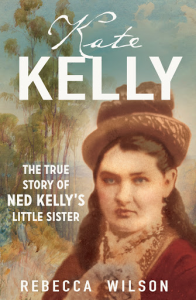
‘Kate Kelly: the true story of Ned Kellys little sister’ on the other hand purports to be nonfiction, the ‘true story’, and therefore potentially is an important contribution. In fact, though its subject is Kate Kelly it’s inevitable discussion of the Outbreak is so laden with demonstrable errors of fact, with claims that make no sense and with recitations of so much already out-of-date Kelly mythology, that I have to seriously question the authors credibility. I had to struggle to complete the book, because I found myself doubting the truth of everything that was written that was new to me, because whenever she touched on topics that were familiar to me she so often got it completely wrong. Why would I believe the author was telling the truth about the things I had no knowledge of when her references to things I did have knowledge of were so often completely wrong?
Heres a few of the obvious clangers, and remember this book purports to be a ‘ TRUE story’:
ONE : Wilson writes that Fitzpatrick ‘arrived without a warrant to supposedly arrest Dan’. Firstly there was no ‘supposedly’ about it – that’s exactly what he went there to do. Secondly I think by now most Kelly students have got the message that in 1878 and still to this very day, there has never been a requirement for arresting police to carry a warrant. This is a fundamental misunderstanding that Mrs Kelly herself laboured under, and so also it seems does Rebecca Wilson, as well as the many uninformed Kelly students who frequent Facebook pages where this misunderstanding is often repeated.
TWO: Wilson writes that Red Kelly was imprisoned for ‘cattle stealing’. No he wasn’t : he was imprisoned for the ‘Unlawful possession of a hide’
THREE :Wilson writes that after Red Kellys death Mrs Kelly went to Greta where ‘they all helped each other start over again despite many setbacks including a house fire lit by Reds brother’ What actually happened was that Reds brother Jim was drunk, his attempt one night to have sex with Mrs Kelly was rebuffed so he set fire to the building, it burned to the ground and the inhabitants including Kate Kelly and 12 other children were lucky to survive. However to call the result of this arson a ‘setback’ is a gross understatement : they were all reduced to complete and abject poverty and Jim went to prison for a long time. Why did Wilson conceal the awful truth of this incident by calling it a ‘house fire’ when it was an almost deadly criminal arson, and not be interested enough in her subject, Kate Kelly to wonder what possible psychological impact such an awful event might have had on the young Kate?
FOUR: “Flood was running a horse stealing racket and had rewarded Anne with gifts and money in return for creating false evidence for him so he could maintain his racket. Ellen believed her daughter when Anne told her Flood had raped her” Wilson doesn’t supply footnotes or references to any of the claims she makes in this book, and I am not aware of any evidence that supports any of these ones about Anne or Flood. The affair between Annie Kelly and Flood was certainly improper on Floods behalf, but Anne was an adult and also married. No rape complaint was ever made. All we know about Flood being a horse stealer is that in the Jerilderie Letter Ned Kelly claimed he was one, but we know that Ned Kelly hated Flood and this claim that he was a crooked Policeman and a horse thief is probably a lie. Notwithstanding his foolish affair, Flood was a highly-respected Policeman in the district. What happened to Annie in childbirth was not his fault.
FIVE: According to Rebecca Wilson, Ellen Kellys “ramshackle shanty was at times a wild place filled with ugly men in filthy clothes whom (she) wrangled with perfection. Police were paid off when they visited as a necessary business transaction and the rough venture kept the Kellys afloat” Where is the evidence for the claim that Mrs Kelly paid off police? Kelly sympathisers will be offended I am sure, but there is no such evidence.
SIX: “George King…felt more like a brother than a father figure, since he was younger than Ned” How long would it take a writer to fact-check that claim: two minutes on the internet, or one if you owned Corfields encyclopaedia? Its wrong – King, born in 1848 was at least 6 years older than Ned Kelly.
SEVEN: ”Alice was always portrayed as Ellens daughter and Kates sister but she was the result of a love affair between Kate and a policeman, Constable Fitzpatrick” Wilsons only ‘evidence’ for this quite extraordinary claim, the most sensational one in the entire book is that according to Wilson, George King had been away for a long time by the date of Alices birth – but nobody knows exactly when King disappeared from the Kelly household, and even if he wasn’t the father, nobody at the time ever doubted it was Ellens baby. Nobody!
This claim of Wilsons about Fitzpatrick being the father and Kate being the mother of Alice is so full of holes its a wonder to me that she has been allowed to get away with making it for so long. The largest hole is that if one assumes the baby was born at the end of a normal pregnancy, conception would have occurred mid-July, before Fitzpatrick was even in the North-east. He arrived at the beginning of August and according to Wilson once he had met Ned Kelly he then came into contact with Kate and then ‘groomed’ her until finally she became pregnant.
But why, if the baby was Kates would Ellen Kelly be breastfeeding her? And why would Mrs Kelly take the baby with her to prison if it was Kates? And why did Kate never make any attempt to assume at any time ever in the future the role of mother to her firstborn? None of these obvious problems are addressed.
I don’t need to go on. Its clear this book is nowhere near a “True” story, and would have much more honestly been called Historical Fiction like Nicole Kellys is. Instead we have a grossly inaccurate account of the things we already knew about Kate Kellys sad story, and no idea of the truthfulness and accuracy of the claims made about the parts of her life that we don’t. This author has sabotaged her own credibility by not sticking to the facts. Adding a long list of sources at the end of the book in which there are no references is no help to her credibility.
I finished up thinking I’ve no idea what to believe, and so decided that reading this book was a complete waste of time.
1 star.
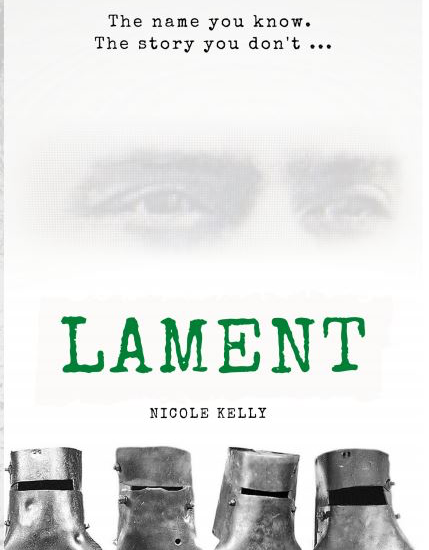
Rebecca Wilson clearly is completely delusional regarding the Kelly’s and in particular Kate Kelly.
Five years ago she made a similar claim that Fitzpatrick was the father of a baby that Kate had, which was part of a Studio 10 presentation. It can be seen here. https://www.youtube.com/watch?v=irNEXQgXpH0
Why publishers accept and sell this fictional made up nonsense is beyond me. Do they have any ethics at all?
The photograph in Wilsons book of the Kelly homestead says it all.
There is Kate and her alleged daughter on the left then in a second group is Ellen and kids and then to the right is the minister Gould. Thats three very distinct groupings. Why??
If it is assumed that If Kate’s pregnancy did NOT run full term then the babys birth in April 1878 is possible.
Fitzpatrick took the opportunity to visit the Kelly hut soon after the babys birth and had a very convenient reason to do so with the warrant for Dan in existence.
Perhaps Kate did not want her baby in the circumstances and so Ellen took the baby to be raised as one of hers??
Here is a close up of the photo you mention.
I see no reason to imagine the way they are grouped adjacent to the verandah poles has some special meaning. And certainly that would be nowhere near being sufficient reason to overturn the Kellys own claims, and the claims of everyone else before Rebecca Wilson that Alice was Ellens baby. The only way youre going to be able to make it work is by stringing together a series of very unlikely events to end up with one thats so unlikely its effectively impossible.
Attachment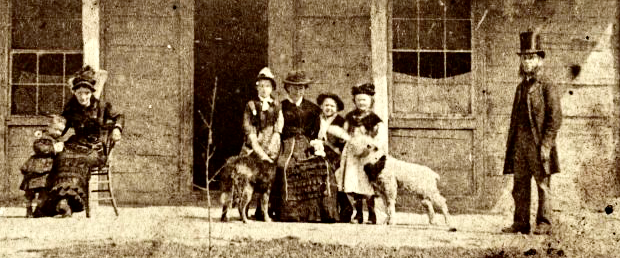
There is as yet little support for your views on ‘Lament’ by Nicole Kelly. In fact, many of the mini-reviews provided by Hawkeye Books are extravagantly pro the book. Noelene Lloyd’s is just one of many. One of Hawkeye’s arms provides vanity publishing possibilities though that is not suggested by me here.
Allen and Unwin have published Wilson’s ‘Kate Kelly: the true story of Ned Kellys little sister’ despite irrefutable evidence that Kelly mythology therein is mistaken and misleading. Excuses for errant publishers are fast running out…
Ian MacFarlane
Lament is probably not going to be read by people who aren’t already Kelly enthusiasts, but I think I said in my review that they will like it, which would explain why Noeleen Lloyd liked it.
As for Kate Kelly, again Kelly enthusiasts will mostly like it becasue they wont notice or care about the historical blunders in it because they believe quite a few of them!
Hello both
Firstly, I am not a ‘Kelly enthusiast’. I am not a ‘Kelly fan’, ‘Kelly fancier’, and most certainly not a ‘Kelly nut’ – some of the many labels that are being thrown around lately like I throw wheat to my geese.
I take a strong interest in history in general, and then local history and my family history in particular.
My family history happens to be part of both local and Australian history.
I am a ‘fan’ and ‘enthusiast’ of keeping my family history and the memories alive. Most of it is not related to Ned Kelly.
I also take a little bit of affront that you presume to understand and comment on why I might enjoy a book without asking me.
I have met and talked with Nicole. She has made no pretence that this book is a work of fiction.
She makes no bones that she has taken artistic licence with the story, as she can, when she writes a fictional piece of work.
In fact, in conversation with her she talked to me about how ‘her Ned’ or ‘her Joe’ have done things that are different from the known truth. Her words to me were ‘the real Ned might not….., but MY Ned did..’.
She has had the courage to write fictional piece. I applaud her for what she has done.
I like her book because I can imagine the characters, I like her writing style, and it was an enjoyable read. Is it factually correct -no. But it does not need to be. It’s fiction. It CLEARLY states it is.
I did not read it as a ‘true story’. Unlike other recent releases.
Please, stop being mind readers, and instead maybe ask questions as to why someone might like or dislike a book.
I liked the Da Vinci Code by Dan Brown too…… and I that could be accused of perpetuating myths and legends – but it was still a fantastic read.
What these book do – I hope- is spark someone’s interest – and that they will want to learn more, that they will become a keen student of history and discover for themselves what is true and what is not.
Have a lovely weekend
Noeleen
Thanks for your thoughts Noeleen,
Didnt I make it clear enough in my review of Lament that it was Fiction? I called it historical fiction but didnt criticise if for not sticking to the known facts – I just noted that non Kelly ‘fans’ – or whatever you wish to call them – might be put off by the incorporation of known falsehoods about the Kelly story…say for example Ned blaming everything on Fitzpatrick. By contrast just about everything in Aidan Phelans Glenrowan was historically accurate, even though he called it historical fiction. But I didnt want to write too much and give away the story.
I would be more interested in your thoughts on the Kate Kelly book.
As for what name to call people who are, lets say, drawn to Ned Kelly – some are clearly nuts, some call themselves sympathisers – its hard to know what the best term is. But none of the terms I use are anywhere near as objectionable and disgusting as the terms directed at us ‘both’ , and other non-enthusiasts by these same people.
On a different track altogether, most people with an interest in the Kelly story know that the Oxley Pound features several times, not least by its mention in Kelly’s Euroa and Jerilderie letters where “Whitty and Burns” are said to have impounded 60 head there on one occasion. But where was the Oxley Pound?
An enquiry to Museums Victoria produced a reference to the Ovens and Murray Advertiser of 26 November 1867, p. 3, reproduced below. As the museum noted, the article gives a specific location, albeit in difficult terms and with reference to indistinct landmarks.
Google maps shows the nearest modern road between Oxley and Wang as the Wangaratta-Whitfield road, but that is not much help in locating the site of the old two-acre pound given the somewhat vague information in the article.
Would anyone happen to know the precise location of the Oxley Pound in Kelly’s day?
Attachment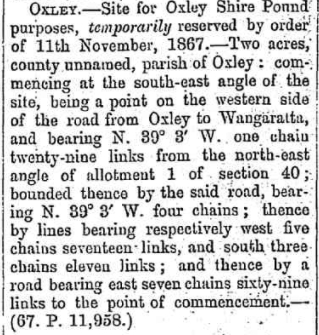
Apologies for getting your name wrong Noeleen! A dumb mistake.
An interview with Nicole is here:
https://ctmitchellbooks.com/blog/interviews/the-nicole-kelly-interview-the-untold-ned-kelly-story/
Some of the publicity for the book is pretty blurry – ‘Lament: The Name You Know. The Story You Don’t…’ – ‘Lament is different because it explores what might have happened if the siege at Glenrowan had gone differently’.
Noeleen hopes readers’ interest will be sparked and they will discover for themselves what is true and what is not. Many pro-Kelly books make this next to impossible by misquoting ‘evidence’, manufacturing ‘facts’, and adulating disproved folklore and myths.
Ian MacFarlane
Here are three short extracts from Lament, which as the reviews note is written in the first person as Ned Kelly’s voice. The first extract has Ned thinking that the Glenrowan Inn is not an obvious place for the gang to hole up with a pile of hostages while they wait for the police train. Writing in the first person means that Ned is necessarily impervious to his captives’ reactions to his purpose of derailing the train and murdering its occupants and any survivors. The reader is invited by the structure of the first person narrative to enter Ned’s psycopathy uncritically; an interesting adventure in moral suspension. Can any of us become Ned Kelly? Is it so easy to suspend our day-to-day moral universe to vicariously enter the mind of a police murderer engineering a much greater deliberate massacre involving innocents? Remember that Kelly said afterwards that anyone on the train (crew and any passengers) deserved what they would have got.
The second extract has Ned not recognising that is the failure of his own piss-poor planning such that the quarrymenwould not have tools to hand, let alone the specialist tools to lift rail lines, that leads him to become “pissed off and kick at the ground”. There is of course a historical inaccuracy here, as Kelly had questioned a captive rail ganger at length at Euroa (at Younghusbands) about what precisely was involved in lifting rail lines, so he knew ful well that the quarryment were not the ones for the job. Do we the readers laugh at his ineptiude or have we already been sucked in to uncritically taking his side? What about the cultural appropriation of the Italina quarryman’s speech? “We havea no tools Mr Ned. They is locked away…” Are Italian labourers fair game for twentyfirst century novelists to poke fun at gtheir language? Isn’t this effectively the same as literary blackface? Shouldn”t the line read, “We have no tools Mr Kelly. They are locked away”. Isn’t that what the foreman said? Accents aside?
The third extract shows Kelly unrelectively blaming others for his own mistakes. This of course is the real Kelly all over. “Things are not going according to plan. F’n hell escapes me, which makes Stanistreet look uncomfortable. Frustration bubbles under my every movement…”. The mind of Kelly as presented thus far is shamelessly self-absorbed; the question for the readers is whether they maintain their own critical moral compass as they read through it, or whether they get absorbed into Kelly’s world as represented in this characterisation. I guess that’s a question for any work of fiction written in the first person.
It could be interesting to compare the way this novel aims to get inside Kelly’s head with the way John Molony’s 1980 “I am Ned Kelly” attenpted to do a similar thing – except that he purported to be presenting Kelly’s thoughts as referenced fact in the guise of non-fiction; and yet it too is a work of fiction (as Molony’s introduction acknowledges) built on selective source references.
Anyone got any good Kelly memes?
Attachment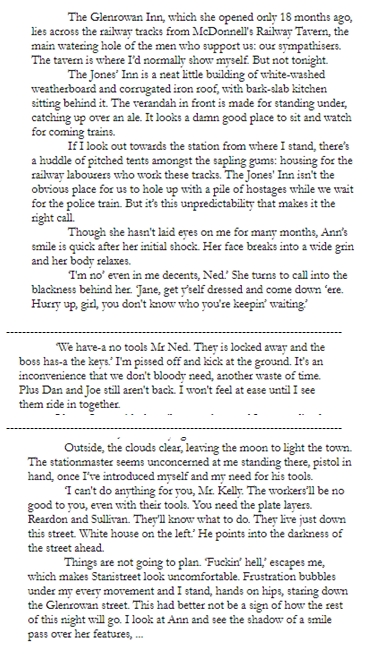
Just noticed a clanger: in the first extract it says, “from where I stand [under Jones’ verandah] there’s a huddle of pitched tents amongts the sapling gums: housing for the railway laboourers who work these tracks”. The tents were for the quarry workers carting gravel, NOT railway workers, and Kelly knew this before he approached the tent. I wonder if the novel has Ned accidentally shooting Metcalf in the face before the siege, just like in real life??? We’ll see…
People keep on excusing Lament as fiction. It is just badly-written nonsense.
“I’m no’ even in me decents, Ned”… Nudge, nudge, wink wink, say no more.
Cam West
Another Peterson-style non-contribution to the ‘glorious’ Ned story. A pointless caricature.
Rebecca
I wonder whether people writing what appears to be pro-Ned historical fiction get ready praise for their efforts while historical fiction critical of Ned would likely not get off so lightly.
For example, Noeleen writes above of Nicole’s Lament that “She has had the courage to write a fictional piece. I applaud her for what she has done.” Suppose I wrote a historical fiction account of the violent sexual assault on Mrs Goodman and trashing of Goodman’s Winton store by Dan Kelly and his two Lloyd cousins in 1877, with the kind of lengthy graphic descriptions of the sex bits that appear in Aiden’s recent Glenrowan historical fiction novel….
Would I get applause for my courage in putting pen to paper? After all, there’s a true story there, with actual gaol time for all three young men, excused as a “lark” by many Kelly writers including Jones. Would it have been a lark if it happened to his wife?
Stuart, if you had been on any Facebook sites dedicated to Kelly, you would know the answer to your question straight away : its no, of course nobody would praise you for your courage. Its a very obvious extreme double standard thats applied : even entirely straight and academic discussions if they are not pro-Ned are ridiculed and their authors mocked and abused – though I should say that I am certain Noeleen Lloyd wouldn’t engage in that sort of thing.
Hi David, I’ve never had Fakebook but I know what you mean. What’s funny or perhaps tragic is the large number of people that cheerfully recycle proven Kelly myths that they presumably believe are true without a single critical thought entering their brains for years on end. Talking to people face to face I am struck by the enormous extent of Jones’s error-ridden influence. The most common stupidity is the Fitzpatrick myth, closely followed by the republic myth, but the tale of a heroic half hour last stand is not far behind.
One can take for granted that practically no one understands that outlawry was not a blanket license to kill in Australia, unlike under the then English law. Etc., etc.
Its a great pity so few people contribute to our discussions. Its probably because there are several bullies in the online Kelly world who patrol these places and attack and label anyone who posts here as anti-Kelly, and as supporters of people they deem to be Kelly “haters”>
The reason I say its a pity is because I perhaps naively still believe there are people with ideas out there who could contribute, and the reason I am thinking about this at the moment is your comment about what are the most common errors relating to the Outbreak that are widely believed by the general public.
I wonder what others would say is the answer?
Personally I think there are several others you havent mentioned which may be at least as widely misbelieved, but I think the most important one is the idea that the Kellys were persecuted. This claim was dismissed by the Commission in 1881 and yet its still advanced by almost everyone who thinks they know anything about the Kelly story.
The other really important misinformation the Kelly myth makers promote is that the [police were all ex criminals, they were all corrupt and on the take. Usually when they post that kind of comment on Facebook they follow it up by saying nothings changed and Victoria Police are still corrupt.
The Kelly myth, and the excuse-making and veneration of such a violent man is such a corrosive and negative influence on Australian life and culture.
Of no importance but up there in popular misunderstanding is “Such is Life”
Hi David, yes I agree with both your points as very important – the persecution myth and the corrupt police myth. I think you have well demolished the persecution myth in a series of blogs and it would be great to see it in a consolidated PDF or other published form with references etc., as your multi-stage case really does demolish a great deal of nonsense.
The idea that most police if Kelly’s day were corrupt is perpetuated by people who are simply historically ignorant. Robert Haldane’s “The People’s Force”, an objective history of the Victorian police force, demolishes that belief with many examples of rural one- and two-man police stations and the community repect they had.
Also interesting is an old book by George Dilnot, “The story of Scotland Yard” (1926) which goes through the history of the London Metropolitan Police from early beginnings with the Bow Street Runners into the 1850s and beyond. This is important as the emerging Metropolitan model of policing was brought to Australia in the goldrush era and John Sadlier has a lot to say about it in his “Recollections of a Voctorian Police Officer” (1913), a key text for Kelly studies as he has several chapters on the outbreak.
Yes, the “such is life” last words myth is another clangerof interest. Should I shamelessly plug my free academic article on it? Might as well. Anyone interested can Google “Ned Kelly’s last words: Ah well I suppose”, and download it. It has other interesting trivia like who were the witnesses at Kelly’s execution.
The London Metropolitan policing model was why the helmet was symbolically changed from the former military style hat to the “bobby” style in 1877, coincidentally the same year Fitzpatrick joined, and can be seen in his photo in uniform.
Alas, Lament’s Nicole Kelly relied on Trove for her Ned research:
http://ballaratwriters.com/blog/a-treasure-trove-in-lockdown/#comment-2839
Robin Hood and the Three Stooges
Her book is fiction so it doesnt really matter if what she writes is not historically correct. Like Peter Careys novel for example.
On the other hand Rebecca Wilsons book on Kate Kelly DOES claim to be historically true but its riddled with mistakes and unverifiable and often extremely improbable claims, so of the two books is the one that really has to be condemned in no uncertain terms. The other is interesting kelly themed entertainment for Kelly admirers like the Author. As long as people don’t think that anything in it is necessarily true, its not a problem, but it does smuggle in a few of the Kelly myths.
Quite so David, but Nicole is being lined up for awards literary or for Ned story-telling, deserved or otherwise.
But as you say, the Wilson book is culpable full stop.
Robin Hood and the Three Stooges
Allen and Unwin were once a very reputable Aussie publishing house. After ‘KATE KELLY: THE TRUE STORY OF NED KELLY’S LITTLE SISTER’, this might no longer be the case. If so, a great misfortune for the industry and them and us.
Gerry Myer
Lament thanks ironoutlaw. com, that says it all.